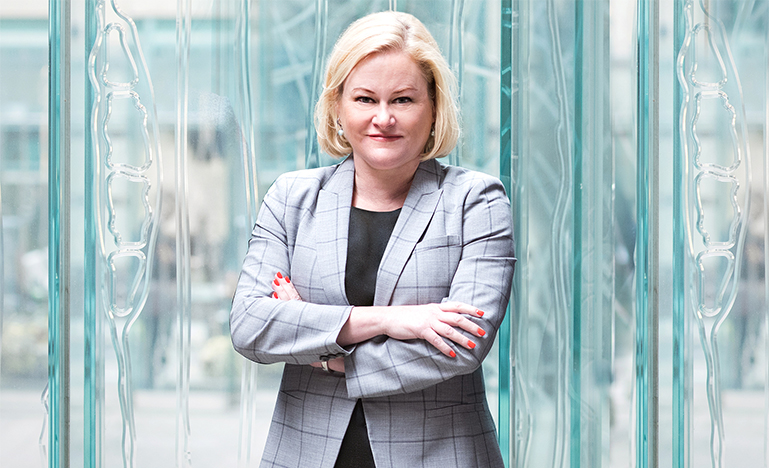Q&A: The case for decriminalizing compensation to surrogates and donors
Toronto-based fertility lawyer Kelly Jordan discusses the challenges surrogates, donors and intended parents face in Canada.

It is prohibited in Canada to compensate surrogates and donors of reproductive material. Last year, the federal government finally introduced regulations – 14 years after the Assisted Human Reproduction Act was first enacted – that propose a list of reimbursable expenses related to donations and surrogacy. The CBA’s position is that the list should not to be exhaustive and allow instead for “reasonable expenses.” It also supports decriminalizing compensation to surrogates and donors. CBA National caught up with Toronto-based fertility lawyer Kelly Jordan (pictured above) to discuss the many challenges surrogates, donors and intended parents face when it comes to assisted reproduction.
CBA National: How did we end up with this legal framework?
Kelly Jordan: At the time of the Baird Commission report on New Reproductive Technologies in the late 1980s, there was a sentiment that we didn't want to commercialize or exploit women as surrogates or men as sperm donors, but primarily the concern was about protecting women. And because the federal government can't legislate in the area of health, it used its criminal law power. So it dealt with surrogates and donors by prohibiting activities and punishing them by imprisonment or a fine. But by the time the legislation passed in 2004, people were thinking a little bit differently about the issue, though there still is a discussion amongst Canadians about whether or not paid surrogacy is appropriate. Even in the U.S., some states have an altruistic model and others where compensation is allowed. The other problem is that expenses in Canada can be reimbursed, but are supposed to be paid under regulations that were never drafted. So, for the last 15 years, we have been advising clients without any guidance about what expenses are permissible.
N: Should surrogates be compensated?
KJ: Some academics and non-practitioners in this area that feel differently than I do. But really, do we expect women to give up at least ten months of their lives to go through that and not be able to get some compensation for it?
N: As for expenses, what are we talking about?
KJ: A surrogate could be reimbursed for loss of work-related income during the pregnancy if a doctor certifies in writing that going to work would pose a risk to her or the fetus. That's a pretty high standard for a loss of work-related income. And the draft regulations don't provide that a surrogate can be compensated for the loss of work-related income post-pregnancy. And typically with gamete donation, there are appointments for stimulating hormones. There is a surgical procedure that, in the best-case scenario, would require a day or two off work after the procedure, and there are appointments that you would have to be at for monitoring before that. But the regulations don't allow an egg donor to be paid for those expenses, which seems unfair in an altruistic model.
N: So do we have to choose between an altruistic model and commercialization?
KJ: Well, it's not one or the other. The reality is that there are way more people looking for surrogates than there are women available to provide the service altruistically. At the same time, women that act as surrogates are very altruistically motivated. You would never do it otherwise. And remember, our model just drives reproductive tourism to jurisdictions where it's very commercial and much more expensive, like California, for instance, where they have very liberal ideas around assisted reproduction. It's very surrogacy-friendly, but it's very expensive.
N: Do we need to decriminalize the whole practice?
KJ: Very few areas of health should be dealt with by the criminal law power. To me, it's reminiscent of the abortion debate. Using the criminal law power to deal with very personal health choices is just too blunt an instrument. It doesn't keep up with evolving health concerns. Regulating at the provincial level is a much more appropriate way of dealing with the potential for exploitation of either intended parents or surrogates — and of dealing with the best interests of children. In fact, the Supreme Court has made it pretty clear that you can't go very far in this area without encroaching on a province's jurisdiction on health.
N: And yet the provinces haven’t exactly stepped up.
KJ: Interestingly, under the Act provinces can adopt their own approach, but other than Quebec, no one has really done so.
N: Why, do you think?
KJ: There just doesn't seem to be the kind of political will to deal with this in any comprehensive way. And yet we know that fertility is decreasing and infertility is increasing. We know that many women have children older, and people are looking to third parties to assist them. It also has a disparate impact on the LGBTQ community because third parties are almost always required to form families. What we need to do is make sure everyone is safe and that kids' best interests are taken into account. But we don’t want to do things that are going to limit access to these kinds of treatments.


